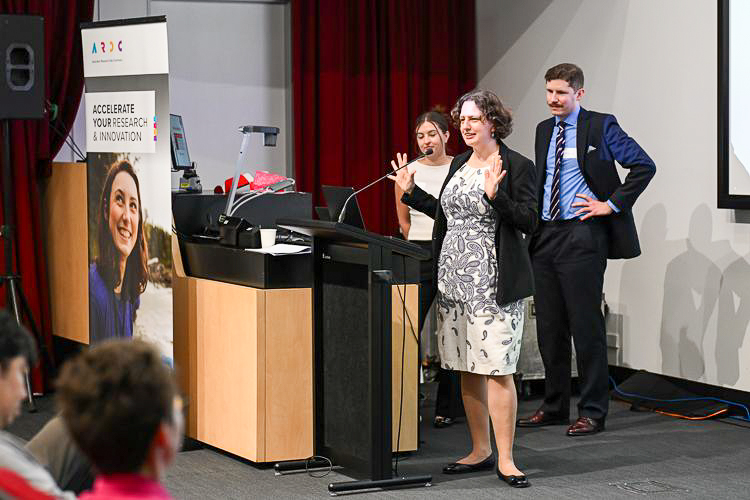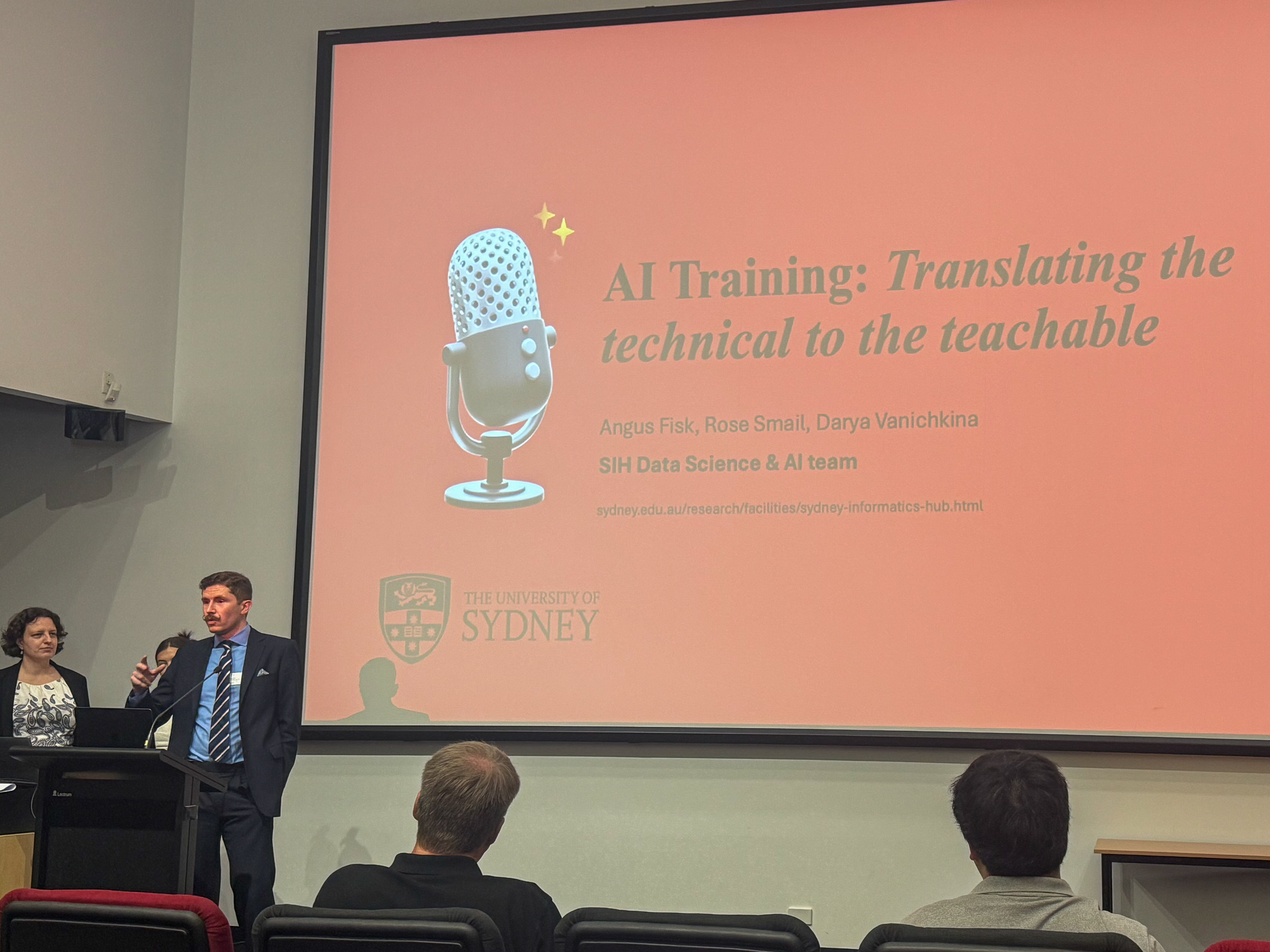The emergence of generative artificial intelligence tools has opened new doors for Australia's research community. The Sydney Informatics Hub at the University of Sydney is helping researchers around the country navigate these new opportunities and the potential pitfalls they present.
AI is technology that helps machines do tasks needing human-like thinking, such as recognising patterns, making decisions or predicting outcomes. You use it every day in things like GPS, spam filters and voice assistants such as Siri.
Generative AI takes this further. It produces text, images, code or music by recognising and recombining patterns from vast amounts of data. Tools like Microsoft Copilot, ChatGPT and many others are already helping people write, design, research and problem-solve in new ways.
Artificial intelligence has long been used by, studied and developed by academics from different disciplines, thanks to the opportunities it presents to make sense of vast datasets , but also for the ethical dilemmas it presents (particularly in regard to bias and responsibility in decision-making processes).
Dr Darya Vanichkina has been at the forefront of using AI for its biomedical applications, with a PhD in genomics and bioinformatics and over seven years of consulting on diverse projects, from gambling harms to predicting patient outcomes in acute care. Now, as Data Science Group Lead at the Sydney Informatics Hub, she helps upskill and support other academics at the University and around Australia to make the most of emerging digital technologies, including generative AI tools like the large language models underpinning ChatGPT, NotebookLM, Anthropic, and countless others.
"There's a huge amount of interest from the research community to adopt the latest developments in generative AI," said Dr Vanichkina.
"That might be for personal productivity, to complement analysis and communications work, develop new diagnostics or software, or even as a subject of research itself. The Sydney Informatics Hub is always finding new users and use-cases and supporting them in using this technology effectively and responsibly."
Generative AI at Sydney
The University of Sydney is known as a national, and global, leader in generative AI in the classroom. Its award-winning Cogniti AI for teachers has gained national attention and is being adopted by higher education institutions around Australia. Students are allowed - and encouraged - to use AI in assessments and have helped shape the University's guidelines on AI use .
For researchers, using generative AI can be a bit more complicated thanks to factors like different fair use copyright laws , issues of data sovereignty (where the data is stored and processed in the world), and participant consent for research done on humans.
"In some cases, such as research collaborations with NSW Health, we need to ensure data doesn't leave NSW, let alone go overseas," said Dr Vanichkina.
"By collaborating with Australia's research and industry communities, as well as experts on AI law on ethics, we're helping ensure Sydney stays at the forefront of these developments and enabling our researchers to access the tools and support they need to benefit from AI."
Dr Darya Vanichkina
To support researchers in navigating the complex landscape, Sydney Informatics Hub has run 20 training sessions since late July, with more than 1200 participants attending the courses. The majority of participants were researchers, spanning every career stage from higher degree by research students to post-docs and seasoned academics. However, almost 40 percent of attendees were professional staff.
More training sessions are planned for November, with the 2026 roster already in development, said Dr Angus Fisk, Data Science & AI Training Lead at Sydney Informatics Hub.
"Demand for training has been incredibly high this year," said Dr Fisk. "AI is everywhere, and researchers understand the importance of making sure they're using it ethically and responsibly, but also effectively."
"So far, we haven't recorded our training sessions for on-demand learning, despite researchers' busy schedules, because the field is moving so fast. We're constantly reviewing new use cases, technologies, and exercises for our sessions to make sure they're up-to-date and at the forefront of generative AI developments.
"I've developed an entirely new course every month - just because there's been so many new things to cover each time."
Testimonials from workshop participants have been overwhelmingly positive, with 95 percent saying they would recommend the workshops to others, and 95.3 percent saying they would attend another.
One participant wrote: "The session was a timely and thought-provoking exploration of AI in the context of disability. It deepened my understanding of the structural vulnerabilities of large language models and ethical concerns around data protection. Most importantly, it helped me see how AI can be designed responsibly to empower users in healthcare settings. This discussion will directly inform how we build our product for real-world impact."

Dr Darya Vanichkina and Dr Angus Fisk presenting at the ARDC Digital Research Skills Summit in Brisbane
Connecting with communities
The Sydney Informatics Hub is more than just a training centre. As part of the University's Core Research Facilities , it also serves as the gateway to the University digital research infrastructure for academics and industry partners. This includes providing data science, statistics, AI, bioinformatics and software engineering consultancy and research project support. The Hub also facilitates access to high performance and cloud computing, and specialist bioinformatics infrastructure - including a dedicated AI-native GPU cluster accessible to University researchers in early 2026 as part of the Sydney Research Cloud (SRC) ecosystem.
The Sydney Informatics Hub is a key contributor to Australia's digital research landscape through its partnerships and professional collaboration with the Australian Research Data Commons (ARDC), the National Computiational Infrastructure (NCI), Pawsey Supercomputing Research Centre Australian BioCommons , Australian Plant Phenomics Network and other National Collaborative Research Infrastructure Strategy (NCRIS) projects , as well as industry partnerships with AI developers and end-users.
Drs Vanichkina and Fisk are also regulars on the speaker circuit, including the ARDC Digital Research Skills Summit and eResearch Australasia 2025 in Brisbane.
"Generative AI offers so many opportunities for researchers, from increasing productivity to helping synthesise data and communicating findings to wider audiences," said Dr Vanichkina.
"By collaborating with Australia's research and industry communities, as well as experts on AI law on ethics, we're helping ensure Sydney stays at the forefront of these developments and enabling our researchers to access the tools and support they need to benefit from AI."

Dr Angus Fisk presenting at the ARDC Digital Research Skills Summit in Brisbane






